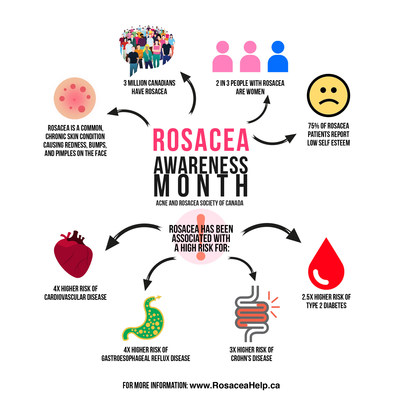Rosacea may be a visible warning marker for hidden, potentially serious diseases
VANCOUVER, March 13, 2018 /CNW/ - Canadians who have rosacea should be aware of associations between the disease and increased risk for a variety of disorders - many with potentially serious consequences – in order to detect these diseases at the earliest stage, according to Dr. Jason Rivers, a Vancouver dermatologist and president of the not for profit Acne and Rosacea Society of Canada.

An analysis(1) published early this year showed the highest associations with rosacea were diseases in 4 categories: cardiovascular, gastrointestinal, neurological and autoimmune. Recent studies have shown those with rosacea have higher risks for:
- Cardiovascular disease – 4 times higher
- Gastroesophageal reflux disease (GERD) - 4 times
- Crohn's disease - almost 3 times
- Inflammatory bowel disease (IBD) - 2 times
- Celiac disease - 2 times
- Type 2 diabetes - 2.5 times
People with rosacea also have a 10 times higher risk of food allergies, 7.5 times greater risk of urogenital diseases (affecting the urinary tract or reproductive organs) and 4 times elevated risk for respiratory diseases.
"These studies show association but do not demonstrate cause," says Dr. Rivers. "For example, rosacea is not caused by these conditions nor do these conditions cause rosacea. These studies show that these disorders tend to co-exist together where if you have one, you have a higher chance of having the other."
The role of inflammation – the immune system's response to potential threat or harm - appears to be a common thread. Rosacea, affecting 3 million Canadians, is an inflammatory skin condition characterized by facial redness, pimples and sometimes irritated eyes. Inflammation is thought to play a role in these cardiovascular, gastrointestinal, neurological and autoimmune diseases.
"Inflammation present in these other conditions is hidden within the body," Dr. Rivers added. "However, rosacea appears on the skin making it a visible marker of inflammation that may be helpful as a warning sentinel for these other conditions."
An important consideration for those with rosacea is that being at risk for these conditions does not mean he or she will go on to develop any of these disorders. "Disease development is different for everyone. Family history, personal history, age, gender, environment, lifestyle and other factors all play a role in disease development," he adds.
"However, simply being aware of the associations of rosacea and elevated risk for these potentially serious conditions can help with early detection, diagnosis and treatment," said Dr. Rivers.
Reference:
- Rosacea comorbidities and future research: The 2017 update by the National Rosacea Society Expert Committee. Gallo RL, Granstein RD, Kang S, Mannis M, Steinhoff M, Tan J, Thiboutot D.J Am Acad Dermatol. 2018 Jan;78(1):167-170. doi: 10.1016/j.jaad.2017.06.150
About the Acne and Rosacea Society of Canada:
The society, a national, not for profit organization, offers hope and help to sufferers by providing independent, reputable and current information on rosacea and raising awareness. For more, visit www.RosaceaHelp.ca
About Rosacea Awareness Month
Rosacea Awareness Month, April 2018, was designated by the Acne and Rosacea Society of Canada (www.RosaceaHelp.ca) to raise awareness about rosacea, a common skin condition affecting more than 3 million Canadians that can cause significant physical and emotional effects.
Media resources:
- Dermatologists with the society are available for media interviews
- 2018 Rosacea Facts and Stats Sheet
- Images of rosacea
During April, the society will be posting news to our bilingual website, www.RosaceaHelp.ca, and Facebook Page, Rosacea Help, and @RosaceaHelp on Twitter.
For more information or to organize an interview with spokespeople for Acne and Rosacea Society of Canada:
Dr. Jason Rivers, Vancouver; Dr. Benjamin Barankin, Toronto; Dr. Jerry Tan, Windsor; Dr. Ari Demirjian and Dr. Jean-Francois Tremblay, Montreal; Dr. Marni Wiseman, Winnipeg; Dr. Catherine Zip, Calgary, Dr. Shannon Humphrey and Dr. Marcie Ulmer, Vancouver

SOURCE Acne and Rosacea Society of Canada
